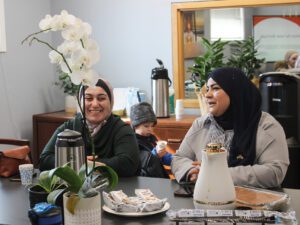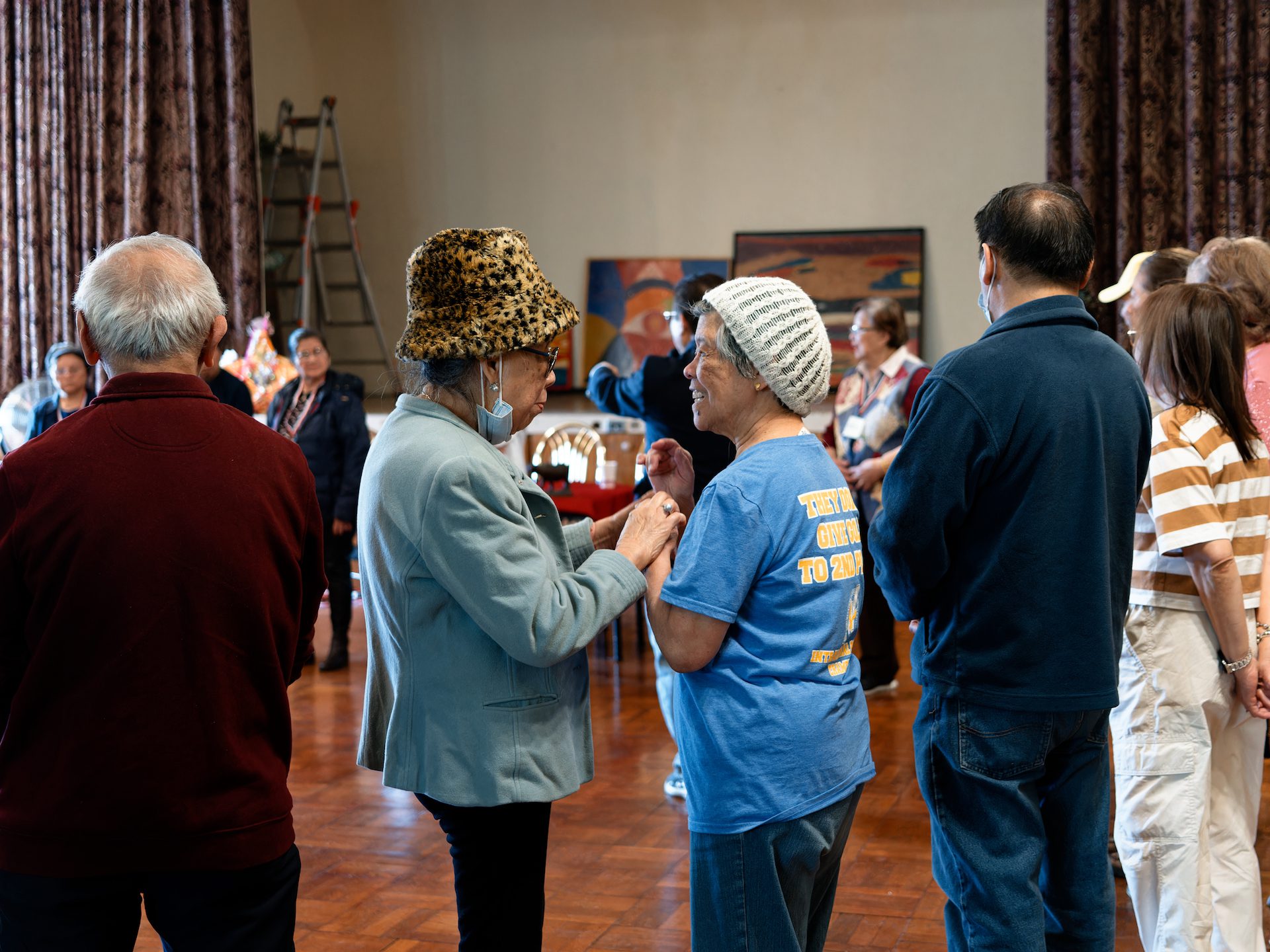 Jack X. Li for Borderless Magazine
Jack X. Li for Borderless MagazineAfter a protracted legal battle over the building’s ownership, Filipino immigrants and Filipino Americans have banded together to restore a community center to its former glory.
Inside the walls of the unassuming, tan-brick Rizal Center on Irving Park Road, a pristine wooden floor supports the weight of dozens of Filipino seniors as they dance, sing and share food for the twice-monthly kapihan, or coffee hour.
Immersed in the enthusiasm of the center’s main programming room, one might never have guessed that less than two years ago, it was on the verge of collapse. The brown wooden floors were splintered and lay haphazardly across the room. The walls, now filled with art from local Filipino artists, were empty, and the halls silent.
The Rizal Center, run by the Filipino American Council of Greater Chicago (FACGC), has survived years of challenges, from ownership battles to financial hardships. But with a new board — and inspiration from a younger generation of Filipino Americans — the center is slowly being restored to its former glory as a pillar of the Filipino community in Chicago.
News that puts power under the spotlight and communities at the center.
Sign up for our free newsletter and get updates twice a week.
With events like the kapihan, a children’s library installation and martial arts classes, the Rizal Center is once again becoming a home away from home for the community. The Filipino and Filipino American volunteers restoring the center’s programming have two main goals: promote and preserve their cultural values and strengthen generational ties.
“We’re rebuilding the center one tile at a time and building the community one person at a time,” said Jerry Clarito, chairman of the FACGC.
Chicago is home to the seventh-largest Filipino population in the country, according to a 2019 analysis by Pew Research Center. As of 2024, at least 169,000 Filipinos were living in Illinois, which has gradually increased since 2016, according to AAPI Data and APIA Vote.
FACGC board member Mae Dawn Gaoat-Lant said community buildings like the Rizal Center are essential to unite and empower the Filipino community in Chicago.
Immigrating to another country can make preserving one’s cultural values difficult. Still, Gaoat-Lant believes the Rizal Center can make it easier by fostering connections for all who come through its doors.
“What we are trying to do right now is to unite the community,” Gaoat-Lant said. “We need to…unite with each other because that’s where [our] strength is.”
A once bustling and thriving community center
Established in 1974, the Rizal Center was named after Dr. Jose Rizal, a leader of the Philippine independence movement who opposed Spanish colonial rule in the country. For decades, the center was a community hub for Filipinos, offering food distributions, hot lunches for seniors, religious services and various community events.
But between 2017 and 2022, a protracted legal battle over the building’s ownership plagued its halls, and the once bustling community center lay quiet as the building was closed to the public.
In August 2022, a judge ruled the building had to be turned over to the current FACGC board.
At the time, the empty, dust-ridden Rizal Center sharply contrasted the vibrance of its former life. In the early ‘90s, the center’s basement had a dance floor with a bar where people would gather for drinks, ballroom dance, bingo nights and food distribution for community members.
Read More of Our Coverage
Fellow board member Corazon Sopena first came to the Rizal Center in 1996. She was part of the “Miss Philippines” pageant hosted by the FACGC. That year, Sopena won the title of “Miss Philippines-Chicago.”
Although the center no longer has a bar or a “Miss Philippines” contest, Sopena has enjoyed returning to dance and interact with friends and other community members.
“I especially enjoy talking to and entertaining the seniors,” Sopena said. “That’s why I enjoy coming here.”
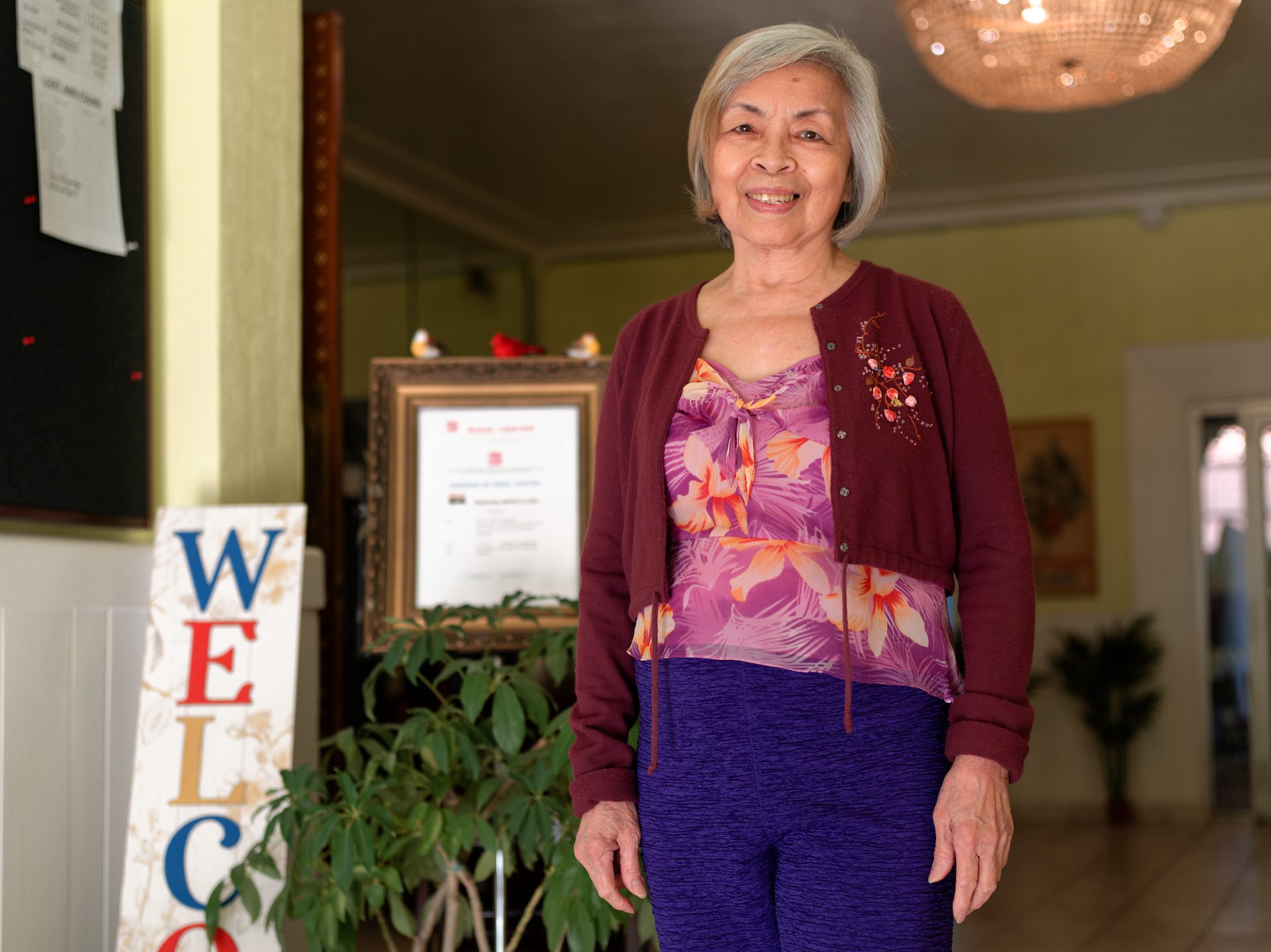
Sopena hopes those who used to come to the center return despite the five-year-long hiatus.
“It’s taking a while, but it’s kind of coming back,” Sopena said. “I wish [those who came in the past would] come back again.”
Revitalizing efforts aim to preserve cultural values
Paula Alcaraz, a second-generation Filipino American, got involved with the center after seeing the FACGC board post a callout on its website seeking volunteers to help with its reconstruction and renewal. Alcaraz had passed by the center in the past and was interested in learning more about it, which is what led her to check out its website.
She was among the first volunteers to help revitalize the center in 2022, and currently runs its social media accounts. While touring the center two years ago, she recalls seeing the center’s floors in disarray and layers of dust coating the floors and walls.
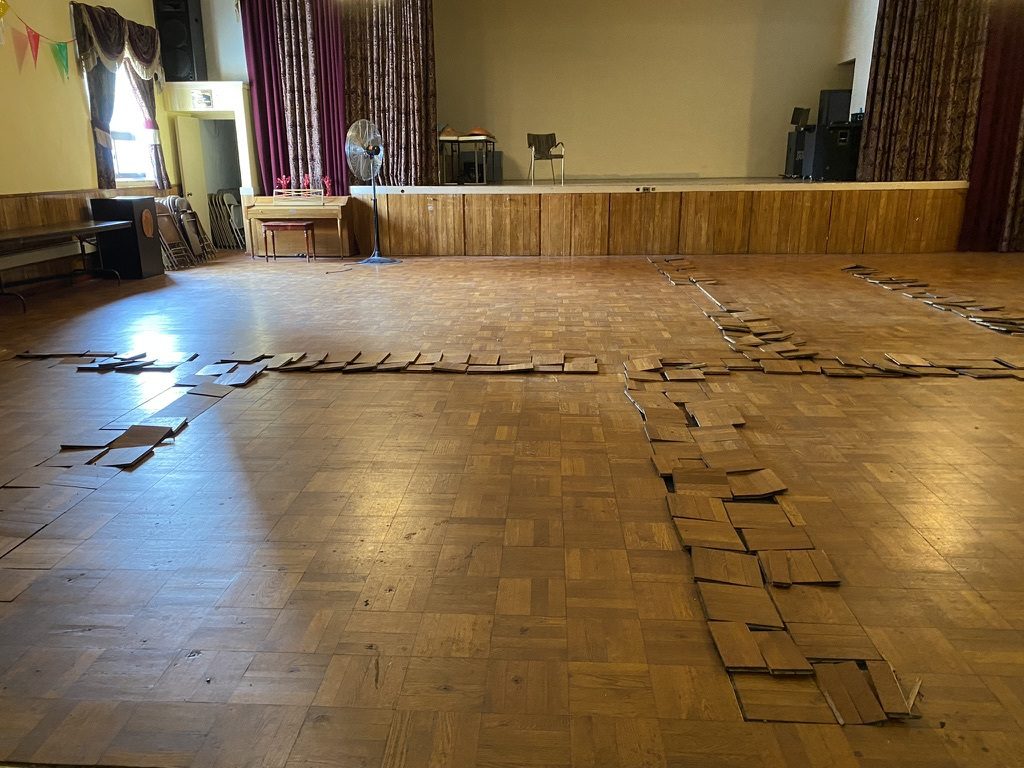
“It was really heartbreaking to see because this was a center for the whole community,” Alcaraz said. “When it opened up…many years ago, this was a place for Filipinos to come and have fun, get together…and they weren’t able to have it anymore.”
Volunteers from the community were crucial in making building repairs at the center. Chicago Filipino community members banded together to offer free services to redo the wooden floors in the auditorium and install new lighting fixtures.
Slowly, Alcaraz said she saw the center coming back to life.
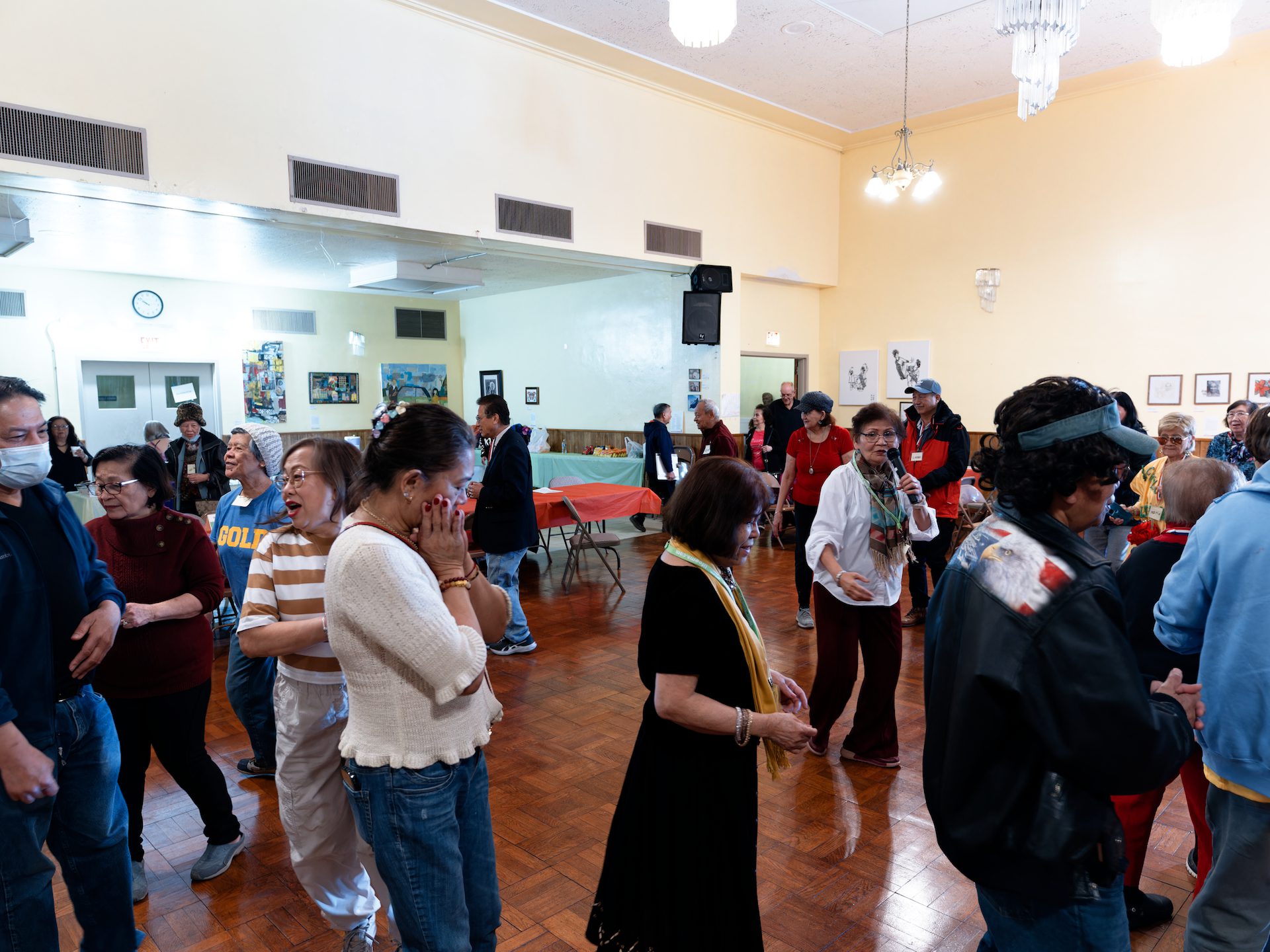
Being a part of the Rizal Center has been a large part of Alcaraz’s journey to stay in touch with her heritage as a second-generation Filipino American. Like many other Filipinos in Chicago, her parents and family have left the city for the surrounding suburbs or moved to another state entirely.
Alcaraz has high hopes for the center. She wants to see the center expand its work promoting Filipino culture and heritage through programs like its children’s library. She pointed toward opportunities for the center to host Tagalog lessons, cooking classes and cultural dance practices.
“I miss the food because I don’t know how to cook it and all these other things,” Alcaraz said of her Lolo and Lola’s, or grandparent’s, cooking. “Whenever I’m around Filipinos, to be honest, I feel like I’m home.”
A new generation of leadership
On a rainy day last fall, 20-year-old Celina Anama, alongside her friends and younger brother, took refuge under the Rizal Center’s awning. She had previously passed the building but never ventured inside — yet it had always piqued her interest, especially as a recent arrival from the Philippines. The center reminded her of the community clubhouses she would see back home.
At the time, a man cleaning the windows invited the group inside to wait out the rain. Anama walked in brimming with intrigue but thought: “What if there’s just one person coming in to clean, and that’s all there is to it?”
But inside, the FACGC board, serendipitously having a board meeting at the time, eagerly greeted the newcomers. The center came to life before her eyes. Board members urged Anama to address them as uncles and aunties as they gathered snacks and refreshments before giving them a tour.
Anama felt connected and reassured after being greeted with open arms and the familiarity of her home and community in the Philippines — especially after uprooting her entire life to live in a foreign country.
“When I first got here… I was walking outside, and although nobody would make you feel different, you feel it inside you,” Anama said. “Because you don’t see anyone that looks like you.”
Board member Gaoat-Lant looks to younger Filipino community members like Alcaraz and Anama to do the work preserving the Rizal Center and the community’s connections to their Filipino heritage. She hopes that building these relationships will empower the entire community to enact change and improvements for more people in the future.
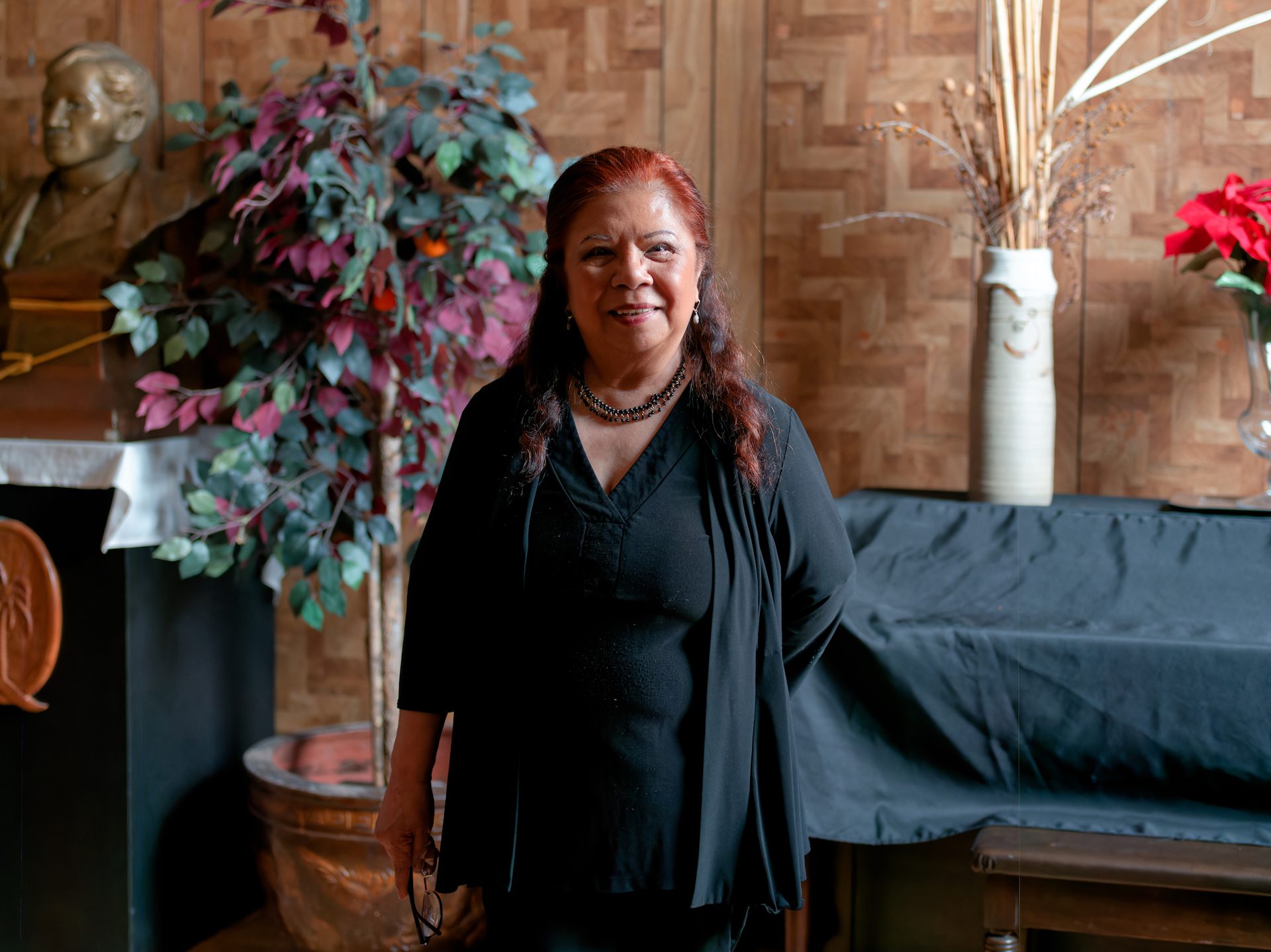
The FACGC board is composed of first-generation Filipino immigrants, most over 70 years old. Gaoat-Lant believes the next generation of Filipino Americans and Rizal Center newcomers will continue rebuilding the center and the community’s collective power for years to come.
“My knees are already weak, and I’m no longer strong,” Gaoat-Lant said with a slight smile. “The youth should carry the torch from now on.”
Younger Filipino community members, like Anama, agree.
She hopes to continue spreading the kindness offered to her by those who welcomed her to the Rizal Center and to get more involved with the center’s programming in the future.
“Who knows?” Anama said with a chuckle. “I could, if I get to stay here for a while, be one of those seventy-year-olds asking to be called an auntie.”
